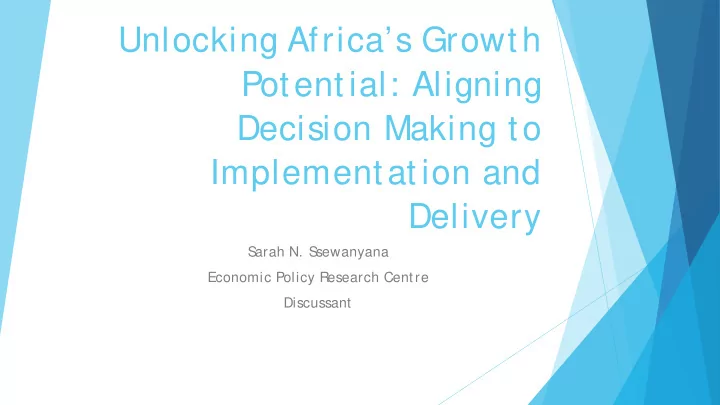

Unlocking Africa’s Growth Potential: Aligning Decision Making to Implementation and Delivery S arah N. S sewanyana Economic Policy Research Centre Discussant
Observations Today’s theme suggests: that African countries has the potential to grow but there seem to be a gap between decision making to implementation and delivery This is a political economy question A shift from business as usual to business as unusual Discussions of this Lecture will feed into the on- going review of the NDP and drafting of the next NDP
I - Context General trends of growth performance of African countries Undergone different growth episodes with different solutions adopted to spur growth 1980-89 2.6% , 1990-99 2.2% , 2000-2011 6% Proj 2015 5.8% Period of st ruct ural adj ust ment s Period of governance relat ed reforms e.g inst it ut ional reforms t hat were int ended t o unlock t he growt h pot ent ial S hift from povert y focus t o development focus (PRS Ps t o NDP)
Impressive growth since 2000s & rising “ middle” class Has partly led to growing interest in the continent as an investment destination and a place to do business;
II - Then what is the Problem? Impressive unsustainable growth Concentrated in a few countries Growth driven by different factors e.g. those commodity driven growth (esp. oil), services, BUT growth in the manufacturing sector has not been impressive - some have argued that high value manufacturing is necessary to unlock Africa’s growth potential Growth is not inclusive – marked with widening inequalities & growing vulnerabilities
III - What are the obstacles to “ desired” growth? (Desired growth – driven by high valued added manufacturing, high tech services, inclusive (at country level) and broad-based across African countries) There is no general consensus Conventional wisdom (no state interference, private sector-led growth, global best practices, good governance etc) New World Bank/ IMF after the global financial crisis Y et t o realize mindset change wit h changing environment
Alternative views – Failure to identify & understand the political economy factors as to why and when certain policies are adopted & whether they succeed in delivering the desired growth The factors are decision making, implementation and delivery as highlighted in today’s theme Polit ics mat t ers; inst it ut ions mat t ers and st at e-societ y relat ions mat t ers Need to get all the three perspectives right if we are to unlock Africa’s growth potential
To get t he polit ics right s, t here is need t o build development al/ effect ive st at es t hat : Control corruption, where political elite are support ive of st ruct ural economic t ransformat ion build development inst it ut ions (e.g. development plans, coordinat e government business), Recruit the best civil servants that are committed and able to deliver), Forge closer partnership between government -business-society (consult but avoid being captured – esp. powerful interest groups), provide policy space to technocrats (should not make them more powerful than the decision makers)
In most African countries decision making powers remain concentrated among few individuals – this would not be a problem if these few individuals remain patriotic, innovative, long-term oriented (beyond regime survival) and pushing for inclusive growth & development. Otherwise, this creates capture by powerful interest groups, reduces on checks & balances – slows implementation How about decisions t hat are made at regional levels t o address development challenges of regional? Ownership & implementation of such decisions at national level Many governments decide but then waver on implementation. We need to learn to decide and execute
For instance, countries/ regional blocks have developed great policies, laws, leading reformers e.g. institutional reforms but with limited focus on implementation and delivery Uganda has a well conceived NDP on paper, but with limited implementation – partly attributed to low levels of funding, buy in from some circles, self-interest etc
Implement at ion hampered by: Ministerial capacity, inter-ministerial cooperation/ connections Low levels of communicat ion & cooperat ion – evident from t he MPS Mind-set change & t eam work No innovat ive ideas t o move t he economy forward Lower LoG – resources and human capacity to carry out & monitor implementation Lack of rigors evaluation mechanism at the point of implementation that would guide any refinements to improve policy along the way Failure t o ident ify st rat egic act ors (from st at e, business, societ y)
In conclusion Unlocking Africa’s growth potential requires a better understanding of the political economy motivations of different actors Africa needs to focus on those conditions that allow strategic actors to cause effective actions. Once again, I wish to thank the organizers of this public lecture for the well thought through theme in memory of Joseph Mubiru, a man that died for his principles
Recommend
More recommend